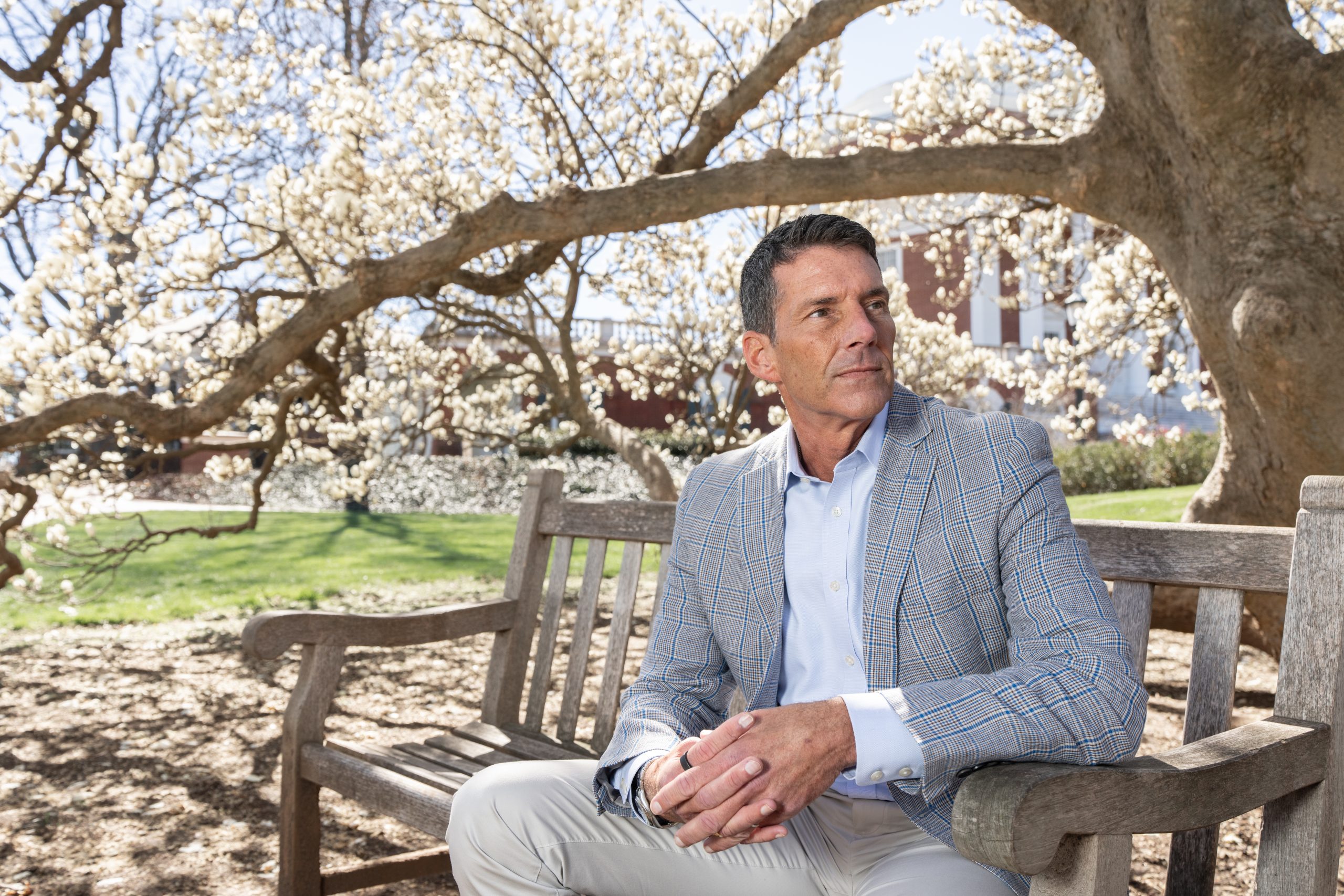
Alec Horniman: Defining Culture and Conversations at Darden for 50 Years
By Dave Hendrick
By his own admission, University of Virginia Darden School of Business Professor Alec Horniman’s academic career path is impossible to duplicate.
It’s a journey that began without a defined goal in mind, and without even the intention of making a career out of teaching.
“I came down and just stayed,” Horniman said from his famously Spartan office, adorned with little more than a table and chair. “I had no aspiration of being a faculty member or professor.”
Horniman came to Darden in 1967, one of a trio of young professors — along with John Colley and Bill Sihler — who would go on to leave indelible marks on the School, aiding its rise from a regional business school to a globally recognized leader in graduate business education.
Prior to making the journey to Virginia, Horniman worked on the pioneering edge of space technology at North American Aviation, watching as the Apollo was built in the office next to his and pursuing a doctorate at Harvard.
It was at Harvard that Horniman got the call that would help define much of his professional life, when Darden Dean Charles Abbott asked if Horniman would come teach at the upstart business school in the learning and organizational behavior area.
“When I came here, I was an assistant professor and tutored the two full professors on teaching the case each day,” Horniman said. “They were full professors, evaluating me for promotion, and I tutored them for two years — if there’s not a catch-22 there!”
Although he succeeded in walking that particular tightrope, Horniman doubts he could have carved out a similar career as a young teacher at today’s Darden, claiming that he never established himself as a top-notch researcher.
Instead, it was in course development and the classroom that Horniman would find his professional passion and interest, teaching, as he puts it, “everything that moved.”
Over the course of his career, Horniman has taught all facets of the Darden MBA and Executive Education, as well as undergraduates studying psychology at UVA. He also regularly leads sessions with professional support staff across the University.
“In my work with students, executives and grad students, I’m able to bring to the classroom the most relevant research that’s out there, and so I think my research contribution is not what I created, but how I have integrated contemporary work today in a way that benefits students in my class,” Horniman said.
Ethical Beginnings
As the first executive director of the Olsson Center for Applied Ethics, Horniman played a founding role in setting the direction of a center that was doing novel work at the time.
In time, ethics would grow to become a hallmark of the Darden curriculum.
“It’s part of our school,” Horniman said. “If you are coming to Darden, you’re going to have an exposure to business ethics, which I think is both practical and quite valuable.”
When teaching ethical concepts, Horniman said he tries to encourage students to understand that every behavior has an ethical and moral dimension — that every action, no matter how small, has a consequence.
“If you are going to talk to someone and you’re not going to look at them and you’re not going to listen to them, then you’re treating them as a means, not as an ends,” Horniman said. “In every exchange we treat people as ends of worth and dignity or we treat people as mere means.”
The philosophy informs his interactions across the School. Every year when new staff are welcomed to Darden, it’s Horniman who is tasked with welcoming and thanking the new employees for their contributions.
Teaching to Think Differently
Although he semi-jokingly rejects the notion that the classroom experience should be “fun,” Horniman cares deeply about creating a comfortable environment where students are open to thought and the free exchange of ideas.
“My role in the classroom is to invite other people to think differently than they would have thought had I not asked the question,” Horniman said. “If we can challenge our students to be willing to think and be willing to be as engaged as possible, then we can make a contribution back to business.”
Horniman’s keen interest in various branches of the neurosciences — and the interplay between those subjects and leadership — has led to a number of courses that became mainstays of the Darden curriculum over the years, including “Managerial Psychology,” “Leading Strategic Change” and “Leadership, Diversity and Leveraging Difference,” among others.
Horniman, who eschews formal lesson plans, says he’s never taught the same class twice.
“I try to create a conversation for mutual learning,” Horniman said. “I learn something and hopefully they learn something.”
A Tireless Proponent of Executive Education
Another hallmark of Horniman’s worldview of the Darden School is a deep belief in the importance and value of Darden Executive Education.
The professor believes educating practitioners and helping them understand what it takes to manage and lead effectively is foundational to the School’s mission and purpose, and a key differentiator from peer schools.
“The challenges for us as a school are to deliver a learning experience second to none, and when we are in that classroom as a faculty teaching, I don’t think anyone can do it any better,” Horniman said. “From an executive learning perspective, the kind of total experience offered at Darden is something we do better than anyone.”
Executive education enriches the broader Darden ecosystem, Horniman believes, as the students bring a wealth of personal and professional experience into case discussions that often illuminate cases in previously unexplored ways.
Even 50 years into a Darden career that unfolded in what he describes as something of a happenstance — enriching both Darden and thousands of students in the process, Horniman said he still grows restless during time away from students and eagerly awaits the start of the cycle that has defined his professional life each fall.
“I found last summer, in particular, was very challenging,” Horniman said. “I look forward to the new year.”
The University of Virginia Darden School of Business prepares responsible global leaders through unparalleled transformational learning experiences. Darden’s graduate degree programs (MBA, MSBA and Ph.D.) and Executive Education & Lifelong Learning programs offered by the Darden School Foundation set the stage for a lifetime of career advancement and impact. Darden’s top-ranked faculty, renowned for teaching excellence, inspires and shapes modern business leadership worldwide through research, thought leadership and business publishing. Darden has Grounds in Charlottesville, Virginia, and the Washington, D.C., area and a global community that includes 18,000 alumni in 90 countries. Darden was established in 1955 at the University of Virginia, a top public university founded by Thomas Jefferson in 1819 in Charlottesville, Virginia.
Press Contact
Molly Mitchell
Associate Director of Content Marketing and Social Media
Darden School of Business
University of Virginia
MitchellM@darden.virginia.edu





